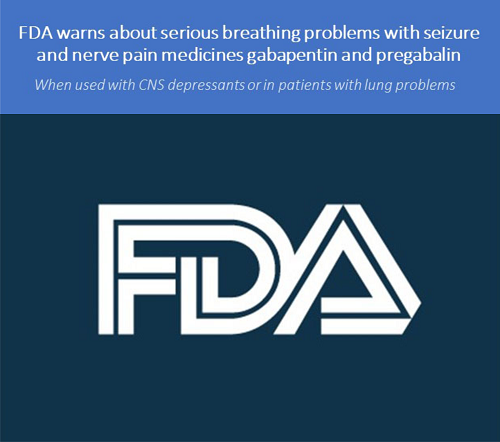When used with CNS depressants or in patients with lung problems
[FDA Drug Safety Communication, December 19, 2019] – The U.S. Food and Drug Administration (FDA) is warning that serious, life-threatening, and fatal respiratory depression has been reported with the gabapentinoids, gabapentin and pregabalin. Most cases occurred in association with co-administered central nervous system (CNS) depressants, especially opioids, in the setting of underlying respiratory impairment, or in the elderly.
Gabapentin and pregabalin are FDA-approved for a variety of conditions, including seizures, nerve pain, and restless legs syndrome.
Our evaluation of respiratory depression with the gabapentinoids provides some evidence contrary to the widely held belief that gabapentinoids lack drug interactions and have wide therapeutic indices. Published studies demonstrate these drugs can behave in an additive way to potentiate central nervous system (CNS) and respiratory depression. CNS depressants include opioids, anti-anxiety medicines, antidepressants, and antihistamines. There is less evidence supporting the risk of serious breathing difficulties in healthy individuals taking gabapentinoids alone.
What should patients and caregivers do?
Patients and caregivers should seek medical attention immediately if you or someone you are caring for experiences symptoms of respiratory problems, because these can be life-threatening. Symptoms to watch for include:
- Confusion or disorientation
- Unusual dizziness or lightheadedness
- Extreme sleepiness or lethargy
- Slowed, shallow, or difficult breathing
- Unresponsiveness, which means a person doesn’t answer or react normally or you can’t wake them up
- Bluish-colored or tinted skin, especially on the lips, fingers, and toes
Always inform your health care professional about all the drugs you are taking, including prescription and over-the-counter (OTC) medicines and other substances such as alcohol.
What should health care professionals do?
When co-prescribing gabapentinoids with another CNS depressant, particularly an opioid, or in patients with underlying respiratory impairment, initiate the gabapentinoid at the lowest dose.
Adjust the dose of both gabapentin and pregabalin in patients with renal impairment and patients undergoing hemodialysis, because both drugs are excreted by the kidneys.
Monitor for symptoms of respiratory depression and sedation, especially when co-prescribing gabapentinoids with an opioid or other CNS depressant such as a benzodiazepine or when prescribing to patients with underlying respiratory impairment, or elderly patients.
The management of respiratory depression may include close observation, supportive measures, and reduction or withdrawal of CNS depressants, including the gabapentinoid. Gabapentinoids used for analgesia or seizure control should be tapered prior to discontinuation. See the prescribing information for specific tapering guidance.
The gabapentinoid prescribing information already includes guidance for health care professionals to caution patients about dizziness, somnolence, and the potential for impaired ability to operate a car or complex machinery.

